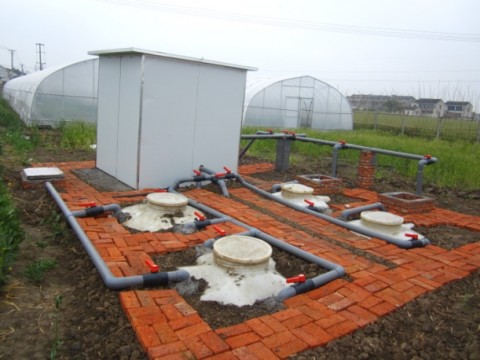This library entry contains background documents for a grant that Bin Fan is leading and which is funded by the Bill and Melinda Gates Foundation.
Further information and a discussion is available on the SuSanA discussion Forum, see link below.
Short description of the project:
After 3 decades of rapid economic increasing, the decision makers of China care for the environment and the elemental well-beings very much more than anytime ago. Among the 0.9-billion population that have not possessed modern sanitation and sewage service, more than a half are unreachable to the centralized wastewater networks. It is estimated that the central and local governments should build decentralized sanitation systems for more than 0.5 billion people in next 20 years.
A question should be answered by the Chinese researchers: need we follow the steps of the westerns to build the traditional wastewater and wastes treatment plants, which consume large quantity of energy, materials and resources just to degrade the remains from what we eat and excrete, or need we seek a more sustainable solution that consume less water and less energy as well as less money while maintain the same sanitary, convenient and organoleptic fit as the traditional ones? This solution must keep the merits such as water-flush and pipe-transportation, since people are not willing to live in the middle ages. We think vacuum sanitary appliances and sewage system as shown in Figure 1 is capable of this Job.
Helped by the 10,000$ from the Bill & Melinda Gates’ Foundation, we built a demonstrate engineering located in Chentang Village, Changsu City, Jiangsu Province in China. The engineering contains 41 vacuum toilets, 750m-length pipeline, a pump-station with a 24m3 tank for storing the blackwater and has served for 23 families over 2 years. The total engineering cost is 430,000 RMBs (~66,000$), which is not more expensive than the traditional system. A prototype vacuum collector for colleting heavy kitchen wastewaters and wastes was also tested in laboratory. If it being integrated into the vacuum sewage system, 80% of the challenges as well as the costs of the domestic wastes disposal will be saved. Recently cooperated with the villager committee, a 0.5-hectre plantation that only uses organic fertilizer was put into operation near by the pump-station. It was estimated 1267 m3 tap water and 5840 KWh energy was saved per year, comparing with the traditional water flush sanitary and wastewater treatment.
Whether the vacuum sanitation appliances and sewage system can serve for thousands and millions of people is not determined by the engineering cost, since the manufacturing cost of the vacuum appliances and equipments is expected to cut off 2/3 when large-scale use. The vacuum sanitation mode means a novel industrial chain with five links: vacuum manufacturing, engineering service, system maintaining service, organic fertilizer produce and usage. How to chain the five links and get policy support is the main challenge we face to.
Goal(s):
to build up a more affordable and sustainable sanitation mode which bases principally on vacuum collection of domestic wastes (excrements and kitchen wastes) and reused them as fertilizer on the premise of satisfying the people’s demands on convenience and aesthetics.
Objectives (or activities or key research components): Build up a pilot scale verification system and fulfill the preliminary technical and economical feasibility study.
Research or implementation partners: Bureau of housing and urban-rural development of Changsu city (Jiangsu Province, China); Jiangsu town & village water technology service company.
Start and end date: April 20, 2011 through April 19, 2012
+++++++++++
Documents available for download below:
1 - Short grant description (July 2013)
Bibliographic information
Fan, B. (2013).
Low-cost decentralized sanitation system based on vacuum collection and reuse of excreta and kitchen waste Various documents on results from research grant Research Center for Eco-environmental Sciences (RCEES), Chinese Academy of Sciences (CAS), China
Filter / Tags
Fundamental research and engineeringOtherEnglish
External links
Further information on discussion forum
Downloads
1 - Short grant description (July 2013)
Download
Type: application/pdf
Size: 0.4 MB

Published in: 2013
Pages: 0
Publisher:
Research Center for Eco-environmental Sciences (RCEES), Chinese Academy of Sciences (CAS), China
Author(s):
Fan, B.
Uploaded by:
Location of library entry:

